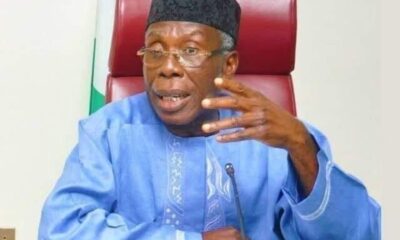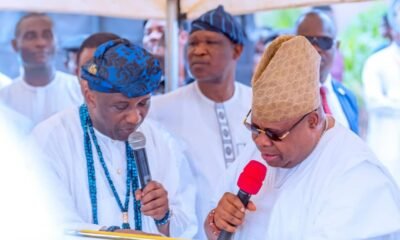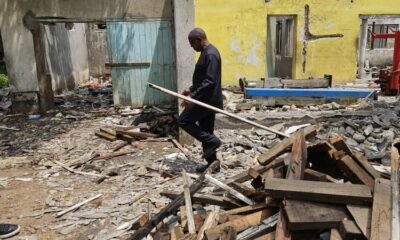News
Presidential Poll: 4 Men, Woman Who’ll Decide Tinubu, Peter Obi, Atiku’s Fate Today

The scene is ready, and the die has been cast. The fate of President Bola Tinubu, former Vice President Atiku Abubakar, and former Governor Peter Obi will be decided by the Presidential Election Petition Court (Tribunal) today after five months of legal scuffles.
In the presidential poll conducted on February 25, 2023, the trio held the top three spots. Atiku ran under the Peoples Democratic Party (PDP) banner, Obi under the Labour Party (LP), and Tinubu ran under the All Progressives Congress (APC) banner. Tinubu was proclaimed the winner by the Independent National Commission (INEC).
READ ALSO:
Separately, Atiku, Obi, the PDP, and the LP are requesting that the court declare Tinubu’s election invalid, declare Atiku or Atiku the winner, and disqualify Tinubu if a re-run is ordered.
The Allied Peoples Movement, APM, also filed a third petition against President Tinubu.
APM specifically argued that Tinubu’s candidature was invalidated by the withdrawal of Mr Masari, who had been previously selected by the APC as its vice-presidential candidate, in light of Sections 131(c) and 142 of the 1999 Constitution, as amended.
In response to the petitioners, Tinubu, APC, and INEC urged the court to uphold Tinubu’s election and reject the petitions of the petitioners.
The five judges—four men and one woman—who will decide fate of the aforementioned candidates are Justice Haruna Tsammani, Chief Registrar of the Court of Appeal and Chair of the Panel; Justice Stephen Adah, Court of Appeal (Asaba Division); Justice Monsurat Bolaji-Yusuf, Court of Appeal (Asaba Division); Justice Moses Ugo, Kano Division; and Justice Abba Mohammed, Ibadan Court of Appeal.
Justice Adah
Justice Stephen Adah, who was born on June 13, 1957, and is from the Kogi State local government area of Dekina, preside over the Asaba Division of the Court of Appeal.
He attended the Nigerian Law School in Lagos for his BL in 1982 after earning his LL.B from Ahmadu Bello University in Zaria in 1981.
On November 12, 1998, he was appointed a judge of the Federal High Court. On November 5, 2012, he was promoted to the Court of Appeals. He was a part of the three-person panel that approved Obi and Atiku’s requests to serve Tinubu with their petitions through an alternative method.
His ruling in the EFCC’s appeal in 2020 against a trial court ruling that largely supported Robert Azibaola, the cousin of former president Goodluck Jonathan, upholding the no-case submission, was one of his historic verdicts.
He led the panel that affirmed Ifeanyi Ubah as a Senator after his sack over alleged certificate forgery. He also led the panel that affirmed Valentine Ozigbo as the PDP governorship candidate for the Anambra State Governorship election.
Justice Tsammani
Justice Tsammani, who was born on November 23, 1959, is a native of the Tafawa Balewa LGA in the Bauchi State. He earned his LL.B from Ahmadu Bello University in Zaria in 1982, his BL from the Nigerian Law School in Lagos in 1983, and on September 17, 1998, he began serving as a High Court judge in Bauchi State.
The longest-serving Justice of the Court of Appeal among the five members of the panel is Tsammmani, who was later elevated to the Court of Appeal on July 16, 2010. He has been on the Court of Appeal bench for half of his 24 years as a judge.
He delivered one of the decisions of the Court of Appeal in Abuja that upheld the election of Yahaya Bello to a second term as governor of Kogi State.
Justice Tsammani prepared the lead judgment that dismissed Abiola Ajimobi’s petition challenging the judgment of the 2019 Election Petition Tribunal, which had on November 19, 2019, upheld PDP’s Kola Balogun as the winner of the senatorial election for Oyo South for lacking in merit. He ruled that a person who was not a member of a political party has no right to challenge the outcome of its primary election.
In February 2022, Tsammani gave the lead judgment of the court that handed the control of APC in Kano State back to the immediate past governor, Abdullahi Ganduje.
He presided over the three-person judicial panel in October 2021 that rejected Uche Secondus, the PDP’s suspended national chairman,’s attempt to have the party’s national convention called off. In addition, Justice Tsammani presided over the court panel that issued the October 2022 decision halting Mazi Nnamdi Kanu’s release from detention after the court had previously ruled that the secessionist’s claims against him were unfounded.
Justice Ugo
The youngest member of the panel is Justice Boloukuoromo Ugo, who is 57 and comes from Bayelsa State’s Kolokuma/Opokua Local Government Area. He graduated with his LL.B from the University of Calabar in 1989, and the Nigerian Law School in Lagos awarded him his BL the following year. On March 21, 2006, he was appointed as a judge of the Bayelsa State High Court. On March 24, 2011, he was promoted to the Court of Appeal.
Justice Mohammed
Justice Abba Mohammed, who was born on February 19, 1961, is a native of Kano State. In 1984, he earned his LL.B degree from the Institute of Administration at Ahmadu Bello University in Zaria. The following year, he attended the Nigerian Law School in Lagos to earn his BL Certificate.
In 2010, he was chosen to serve as a judge on the Federal Capital Territory (FCT) High Court.
On June 28, 2021, he was promoted to the Court of Appeal after nearly ten years of service. In 2019, he served as the Tribunal for the Nasarawa State Governorship Elections’ Chairman.
David Ombugadu, a PDP candidate for governor in the 2019 general election, had filed a lawsuit against INEC and APC Governor Abdullahi Sule. The case was denied by Justice Mohammed because it lacked validity and the petitioner’s claims of excessive voting and election violence could not be supported.
Justice Bolaji-Yusuf
Justice Bolaji-Yusuf, who was born on August 7, 1959, is the sole woman on the court’s five-person panel and comes from Oyo West LGA in Oyo State. In 1983, she graduated with an LL.B. from Obafemi Awolowo University in Ile-Ife. The next year, she went to the Nigerian Law School to get her BL certificate.
On January 30, 1997, she was appointed as a judge of the Oyo State High Court. On March 24, 2014, she was promoted to the Court of Appeal.
In the contentious impeachment of Senator Rashidi Ladoja, former governor of Oyo State, Justice Bolaji-Yusuf delivered a ruling invalidating the actions made by Justice Afolabi Adeniran, then acting chief judge of Oyo, which resulted in Ladoja’s wrongful dismissal.
Her decision was the first significant setback to the entire impeachment procedure, which the Supreme Court later overturned and which led to Ladoja’s reinstatement as governor of Oyo on November 11, 2006.
She also delivered the majority decision of the three-person Benin Division Court of Appeal bench that upheld Mr. Godwin Obaseki’s election as governor of Edo State for a first term in June 2017. She was a member of the panel that determined that the Obaseki-faction candidates would be eligible to run in the elections of 2023.


























